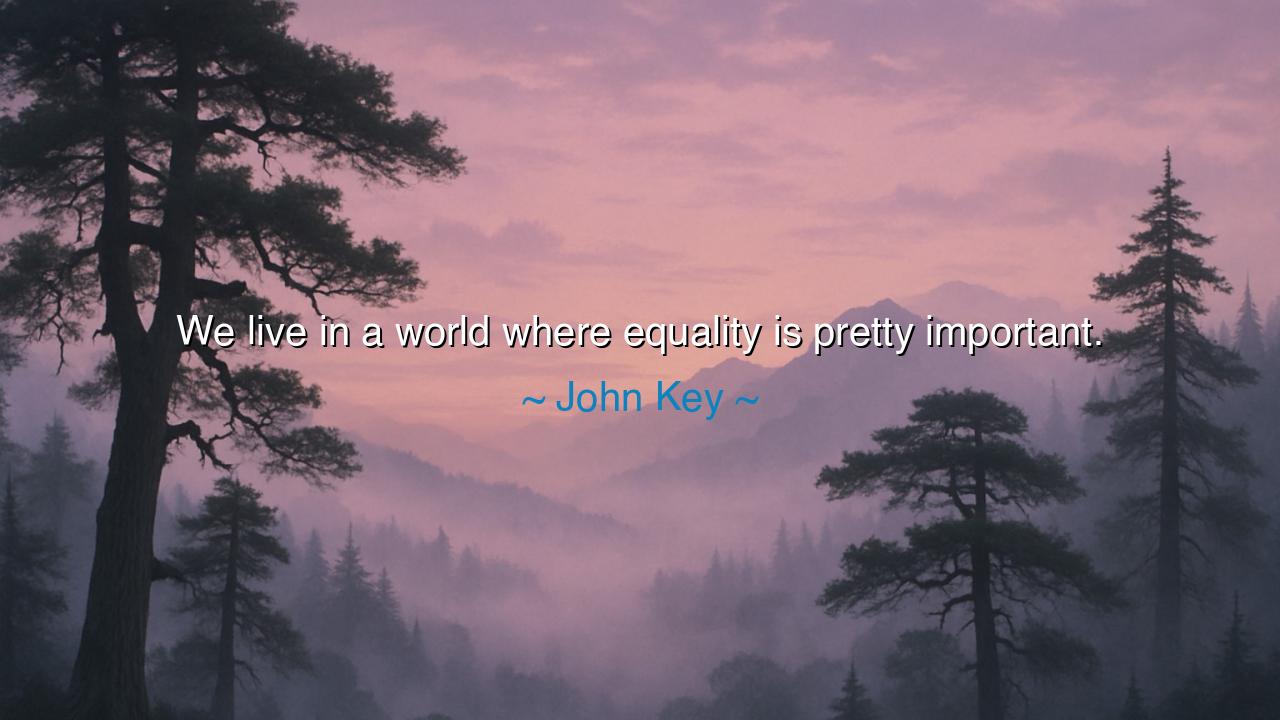
We live in a world where equality is pretty important.






The words of John Key, simple in form yet vast in spirit, remind us of one of humanity’s greatest pursuits: “We live in a world where equality is pretty important.”
Though his tone is modest, his truth is eternal — that equality is not a fashion of politics or a banner of protest, but the foundation of civilization itself. To live in a world where equality matters is to live in an age that has begun to awaken from its ancient sleep — to see that dignity does not belong to the few, but to the many; that worth is not bestowed by birth or wealth, but by being human. The world has long struggled toward this light, and even now, its rays have not reached every corner. Yet, as Key suggests, our generation stands in a time when the call for equality has become a measure of moral maturity.
John Key, once the Prime Minister of New Zealand, spoke these words not as a philosopher, but as a leader shaped by the pulse of modern society — a society that has seen the cost of division and the power of unity. New Zealand, his homeland, has been a land of firsts in this struggle. It was there, in 1893, that women were granted the right to vote, long before much of the world dared to consider such justice. It is a nation built upon the meeting of cultures — the Māori and the settlers — striving through time to walk side by side in respect. In this land, equality is not an abstract idea, but a living experiment, a daily task of balancing histories and healing wounds. Thus, when Key spoke these words, he echoed not only his own belief, but the spirit of his people — that fairness is not luxury, but duty.
The ancients, too, spoke of this harmony. In the teachings of Confucius, equality begins in the heart: that rulers and ruled alike must walk the path of virtue. In the Greek agora, democracy was born — imperfect, limited to free men, yet it planted a seed that would grow through the ages. That seed has become the idea that no person’s voice should be silenced, and no destiny should be predetermined. Through centuries of kings and revolutions, the world has wrestled with this truth: power must not rest upon privilege, but upon justice. Equality, then, is not a gift from the strong, but the natural right of all.
Yet equality, as Key’s statement implies, is not complete. It is a living promise, always tested and never fully won. The world he speaks of — the one where equality is important — is also a world where inequality still thrives in subtler forms: in opportunity, in wealth, in how we listen and how we see. The danger lies not in oppression alone, but in indifference — in forgetting that progress made can still be lost. To value equality “as pretty important” may sound mild, but it carries the weight of responsibility: to ensure that no human is left unseen or unheard, even when comfort tempts us to look away.
Consider the story of Nelson Mandela, who endured twenty-seven years in prison so that his nation might rise beyond hatred. When he emerged, he did not seek revenge, but reconciliation. In his heart, equality was not a word but a living principle, greater than pain, greater than pride. His life reminds us that equality is not won in speeches, but in forgiveness, courage, and action. It is the daily choice to see another person as equal in worth, even when history or anger whisper otherwise. Through such lives, the world learns what equality truly means — not sameness, but shared humanity.
Thus, let all who hear John Key’s words remember: equality begins not in the laws of nations, but in the habits of the soul. It is built every time we listen with empathy, every time we refuse to rise by pushing another down. It grows when leaders serve, when communities protect the weakest among them, when differences become strengths rather than walls. The world may never be perfectly equal — but it can be perfectly committed to the pursuit of equality.
So, my child, walk through this world as a bearer of that light. Treat no one as lesser, and accept no privilege that denies others their due. Speak gently to the forgotten, and boldly to the unjust. For though the world is vast and its injustices old, every act of fairness, every moment of compassion, is a thread in the tapestry of equality. And when enough of us weave these threads together, then — and only then — will we live not just in a world that says equality is important, but in one where it truly is.






AAdministratorAdministrator
Welcome, honored guests. Please leave a comment, we will respond soon